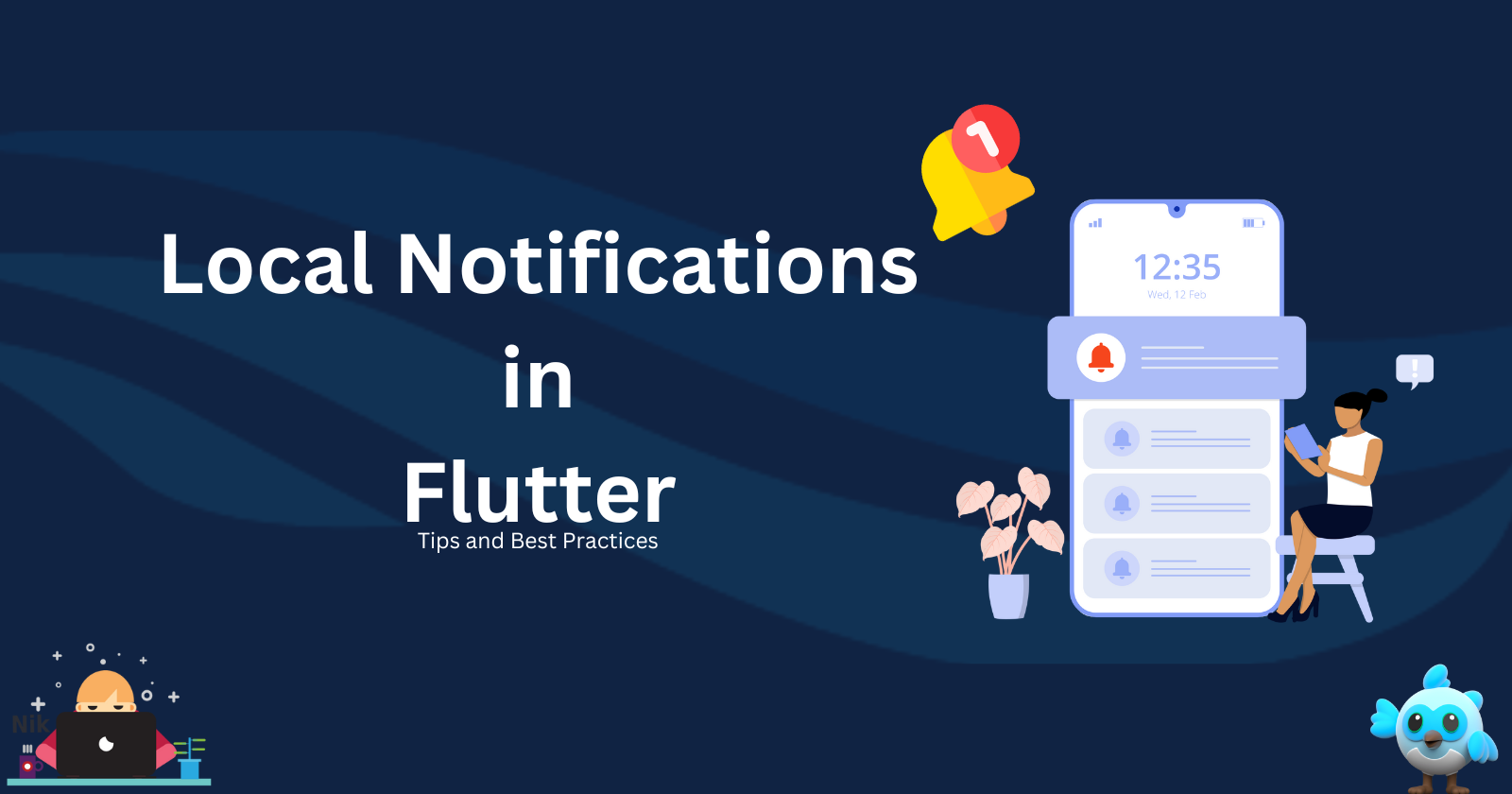Integrating Local Notifications in Flutter Using flutter_local_notifications Package
 Ravi Patel
Ravi Patel
Mobile apps often need to send notifications to users, whether it’s for reminding them of an event, notifying them about a new message, or delivering important information. Local notifications are an essential feature for apps that aim to engage users without requiring an active internet connection. Flutter, with its powerful plugin ecosystem, provides the flutter_local_notifications package to handle local notifications seamlessly.
In this blog, we’ll walk through the process of integrating local notifications into a Flutter app using the flutter_local_notifications package.
1. What is the flutter_local_notifications Package?
The flutter_local_notifications package is a cross-platform plugin for displaying notifications in a Flutter app. It supports both iOS and Android and allows developers to send scheduled, repeating, and customizable notifications locally on the user’s device.
2. Adding the flutter_local_notifications Package
To start using local notifications in Flutter, you first need to add the necessary package to your pubspec.yaml file:
dependencies:
flutter_local_notifications: latest_version
Run flutter pub get to install the package.
3. Platform-Specific Configuration
Android
To configure Android notifications, add the following permissions in your AndroidManifest.xml file located in android/app/src/main/AndroidManifest.xml:
<uses-permission android:name="android.permission.RECEIVE_BOOT_COMPLETED"/>
This permission allows your app to handle notifications even after a device reboot. You’ll also need to configure the default notification icon in the res/drawable folder by creating a new image file and referencing it in AndroidManifest.xml like this:
<meta-data
android:name="com.google.firebase.messaging.default_notification_icon"
android:resource="@drawable/your_icon_name"/>
iOS
For iOS, you need to request permission to show notifications. To do this, modify the Info.plist file located at ios/Runner/Info.plist:
<key>UIBackgroundModes</key>
<array>
<string>fetch</string>
<string>remote-notification</string>
</array>
4. Initializing Local Notifications
Before you can start showing notifications, initialize the plugin in your main.dart file:
import 'package:flutter/material.dart';
import 'package:flutter_local_notifications/flutter_local_notifications.dart';
void main() {
runApp(MyApp());
}
class MyApp extends StatefulWidget {
@override
_MyAppState createState() => _MyAppState();
}
class _MyAppState extends State<MyApp> {
FlutterLocalNotificationsPlugin flutterLocalNotificationsPlugin;
@override
void initState() {
super.initState();
flutterLocalNotificationsPlugin = FlutterLocalNotificationsPlugin();
var initializationSettingsAndroid =
AndroidInitializationSettings('@mipmap/ic_launcher');
var initializationSettingsIOS = IOSInitializationSettings();
var initializationSettings = InitializationSettings(
android: initializationSettingsAndroid, iOS: initializationSettingsIOS);
flutterLocalNotificationsPlugin.initialize(initializationSettings);
}
@override
Widget build(BuildContext context) {
return MaterialApp(
home: HomeScreen(),
);
}
}
5. Displaying a Simple Notification
Once initialized, you can create a simple notification:
import 'package:flutter_local_notifications/flutter_local_notifications.dart';
void showSimpleNotification() async {
var androidPlatformChannelSpecifics = AndroidNotificationDetails(
'your_channel_id', 'your_channel_name', 'your_channel_description',
importance: Importance.max, priority: Priority.high, ticker: 'ticker');
var iOSPlatformChannelSpecifics = IOSNotificationDetails();
var platformChannelSpecifics = NotificationDetails(
android: androidPlatformChannelSpecifics, iOS: iOSPlatformChannelSpecifics);
await flutterLocalNotificationsPlugin.show(
0,
'Hello!',
'This is a simple notification.',
platformChannelSpecifics,
);
}
This simple function sends a notification with the title “Hello!” and the message “This is a simple notification.”
6. Scheduling Notifications
To send a notification at a specific time, you can use the following code to schedule it:
import 'package:flutter_local_notifications/flutter_local_notifications.dart';
import 'dart:async';
void scheduleNotification() async {
var scheduledNotificationDateTime =
DateTime.now().add(Duration(seconds: 5));
var androidPlatformChannelSpecifics = AndroidNotificationDetails(
'your_channel_id', 'your_channel_name', 'your_channel_description',
importance: Importance.max, priority: Priority.high, ticker: 'ticker');
var iOSPlatformChannelSpecifics = IOSNotificationDetails();
var platformChannelSpecifics = NotificationDetails(
android: androidPlatformChannelSpecifics, iOS: iOSPlatformChannelSpecifics);
await flutterLocalNotificationsPlugin.schedule(
0,
'Scheduled Notification',
'This notification was scheduled to show after 5 seconds.',
scheduledNotificationDateTime,
platformChannelSpecifics);
}
This notification will trigger 5 seconds after you call the function.
7. Repeating Notifications
To create a repeating notification, you can use the showDailyAtTime or showWeeklyAtDayAndTime methods:
void showDailyNotification() async {
var time = Time(10, 0, 0); // Set time to 10:00 AM
var androidPlatformChannelSpecifics = AndroidNotificationDetails(
'your_channel_id', 'your_channel_name', 'your_channel_description',
importance: Importance.max, priority: Priority.high, ticker: 'ticker');
var iOSPlatformChannelSpecifics = IOSNotificationDetails();
var platformChannelSpecifics = NotificationDetails(
android: androidPlatformChannelSpecifics, iOS: iOSPlatformChannelSpecifics);
await flutterLocalNotificationsPlugin.showDailyAtTime(
0,
'Daily Notification',
'This notification will repeat every day at 10:00 AM.',
time,
platformChannelSpecifics);
}
This sends a daily notification at 10:00 AM.
8. Customizing Notifications
You can customize notifications by adding a large icon, a sound, or vibration patterns to make them more engaging for users. For example, to add a custom sound:
var androidPlatformChannelSpecifics = AndroidNotificationDetails(
'your_channel_id', 'your_channel_name', 'your_channel_description',
sound: RawResourceAndroidNotificationSound('your_sound'),
importance: Importance.max, priority: Priority.high);
Make sure to place your custom sound file in the android/app/src/main/res/raw folder.
9. Handling Notification Taps
You can handle what happens when a user taps a notification by providing a callback function in the initialize method:
flutterLocalNotificationsPlugin.initialize(initializationSettings,
onSelectNotification: (String payload) async {
if (payload != null) {
print('notification payload: $payload');
// Navigate to a specific screen when tapped
}
});
10. Conclusion
The flutter_local_notifications package makes it easy to integrate and manage notifications in your Flutter app. With the ability to send simple, scheduled, and repeating notifications, this package provides all the essential tools for keeping users engaged with timely alerts.
Whether you’re building a to-do app that reminds users of tasks or a social app that notifies users of messages, integrating local notifications ensures a better user experience. Explore the various customization options and enhance your app’s functionality by leveraging the power of notifications!
Subscribe to my newsletter
Read articles from Ravi Patel directly inside your inbox. Subscribe to the newsletter, and don't miss out.
Written by

Ravi Patel
Ravi Patel
"📱 Passionate Flutter Developer with 6+ years of experience, dedicated to crafting exceptional mobile applications. 🚀 Adept at turning ideas into polished, user-friendly experiences using Flutter's magic. 🎨 Design enthusiast who believes in the power of aesthetics and functionality. 🛠️ Expertise in translating complex requirements into clean, efficient code. 🌟 Committed to staying updated with the latest trends and continuously pushing boundaries. Let's create something extraordinary together!"